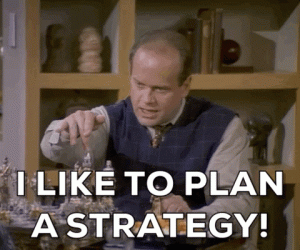When your career reaches its finale and the days of full time golfing are imminent, will you be able to pass the slipper test? By this I mean, when you’re sitting in your arm chair, cup of coffee and a chocolate digestive in hand and wearing the slippers that the children bought you for Christmas many moons ago – will you be able to reflect and feel content that you have no regrets over an if, buts and maybe moment? When there was an outcome you were striving to achieve or a difficult scenario that seemed like an uphill battle, did you have a strategy in place?
Delivering a strategic plan is crucial to all organisations, regardless of size. When it comes to this type of strategy, you have to encourage openness within your team to allow for fruitful debate and exchange of ideas. A well-crafted and executed strategy establishes the foundations which the organisation can create, monitor and benchmark their success against, yet many teams struggle to define their strategy and don’t fully comprehend the purpose of what they’re doing.

Why is Strategy Important?
Strategy is necessary so that all team members have a clear understanding of what is expected of them. It helps organisation’s understand their core capabilities, identify and rectify weaknesses or risks. It allows everyone to focus on delivering optimal performance, productivity and profit, both now and in the future.
Businesses must maintain a competitive, relevant offering in an everchanging, global market. Listening to your potential and existing customers is now more important than ever in ensuring that your products not only align with their needs, but exceed them in ways that hadn’t even considered.
A very simple check to use to discover if your business has a current viable strategy in place is to see if you can answer the following 3 questions:
- Where are we going?
- Why are we going there?
- What’s my role?
If you believe you can answer the questions then you’re probably on the right road, if not then consider the following:
- Strategy plan should have a long-term view of the business (3+ years) and clarify and focus the unique position of the business relative to its competitors.
- The business strategy of a company should provide the big picture overview that shows how all the individual activities are coordinated to achieve a desired long-term end result.
- Strategy needs to consider the opportunities and threats in the outside business world and the internal strengths and weaknesses of the business.
- It is through the execution of preparing a strategy that the overall direction of the business is set and is why strategy is important.

The “Slipper Test”
And as for the slipper test, when it comes to the reflective moment at the end of your business career, having the right strategy in place streamlines your business so that every pound and minute is spent working towards a vision and direction that the whole organisation is aiming for. This gives you the most likely, satisfying way of passing the slipper test and avoiding the If’s, But’s and Maybe’s for good.

Conclusion
As a recent graduate, it is safe to say I am a fair way off sitting the Slipper Test. However, having a solid strategy is fairly important to me both in my professional and personal life, as I’m sure it is for many of you reading this. Having a plan and strategy in place is crucial to the way many of us live our lives. Whether it be for personal or professional reasons, MindGenius offer a number of templates to help you achieve your strategic goals, this page can be found here.

